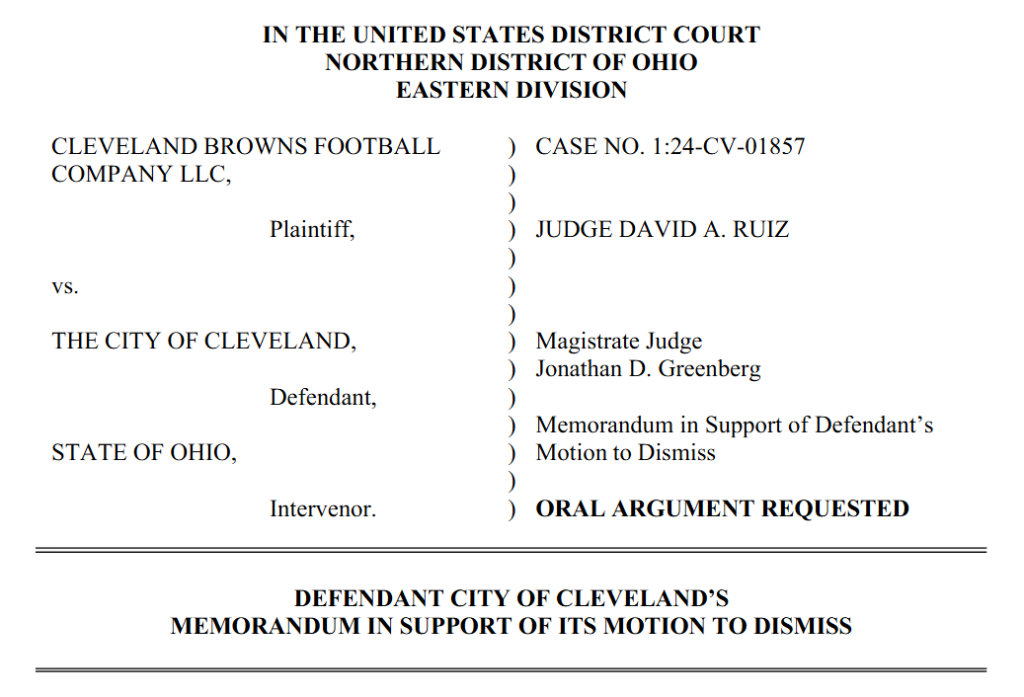The City of Cleveland has taken legal action to stop the Cleveland Browns from leaving their lakefront stadium and building a domed facility in Brook Park. The lawsuit, filed in Cuyahoga County Common Pleas Court, seeks to enforce the “Modell Law,” a state statute requiring professional sports teams that use tax-supported facilities to either gain local approval for relocation or provide six months’ notice, offering the city or residents the chance to purchase the team.

The legal battle arises from the Browns’ October announcement of plans to construct a $2.4 billion stadium and entertainment complex in Brook Park, about 15 miles south of their current home. The team’s lease at Huntington Bank Field is set to expire at the end of the 2028 NFL season.
Legal Maneuvering Over the Modell Law
The Ohio Attorney General’s Office and Cleveland leaders have both filed motions to dismiss a federal lawsuit by the Browns seeking to overturn the Modell Law. Ohio Attorney General Dave Yost argued the law is neither vague nor unconstitutional, highlighting its prior use in preventing the relocation of the Columbus Crew soccer team in 2019.
“The Browns accepted taxpayer money to support their operations. If they can navigate the complexities of NFL ownership, they can also be expected to comply with a three-paragraph Ohio law,” Yost wrote in his filing.
Cleveland Law Director Mark Griffin emphasized that the lawsuit in state court should take precedence, asserting the city’s duty to protect taxpayers’ investments in the team and stadium.
Cleveland’s Offer and the Browns’ Response
In August 2024, Cleveland proposed a $1.2 billion plan to renovate Huntington Bank Field and extend the Browns’ lease by 30 years, offering $461 million in public funding. Days later, the Browns unveiled plans for a domed stadium in Brook Park, arguing it would generate year-round revenue and enhance the region’s competitiveness for major events.
Despite city officials’ objections, the Haslam Sports Group has pursued state and county funding for the project, seeking approximately $600 million in public contributions. Cleveland Mayor Justin Bibb expressed his frustration with the Browns’ decision, emphasizing the city’s extensive financial support for the team over decades.
“Hard-working Clevelanders have invested over $350 million to support Cleveland Browns Stadium. I have a fiscal and moral responsibility to protect that taxpayer investment,” Bibb said.
Economic and Legal Implications
Studies commissioned by the city and the Browns present contrasting visions of the proposed relocation. Cleveland’s analysis claims the move would result in a $30 million annual economic loss and $11 million in reduced tax revenue for the city. In contrast, the Browns’ study projects $1.2 billion in economic activity and nearly 5,400 jobs for Cuyahoga County if the stadium is built in Brook Park.
Cuyahoga County Executive Chris Ronayne has criticized the relocation plans, urging the Browns to prioritize renovating their current stadium.
A Legacy on the Line
The Browns have called Cleveland’s lakefront home since their inception in 1946, returning as an expansion franchise in 1999 after Art Modell’s controversial relocation of the team to Baltimore. The ongoing dispute echoes that history, as the city fights to retain the team and its economic and cultural significance.
Mayor Bibb remains open to negotiations, stating, “Cleveland should not be left empty-handed if the Browns leave. My arms are open for dialogue to keep the Browns playing — good or bad football — on the shores of Lake Erie.”
The court battles are expected to intensify in the coming months, with the Browns’ future home hanging in the balance and Cleveland determined to protect its legacy.